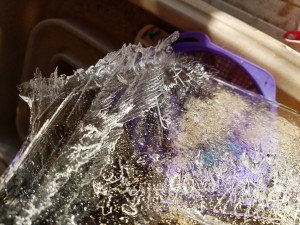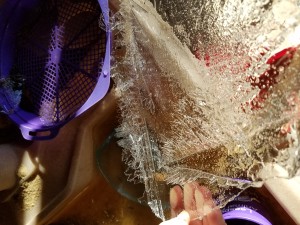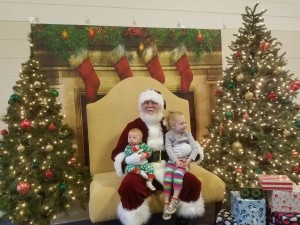Each Christmas, I fill my wish list with books to read during the upcoming year. This year, I received a small stash, which I look forward to tackling. Check out my reading list, and then enter the giveaway at the end of this post for a chance to win The Scarred Letter or Faulkner’s Apprentice.
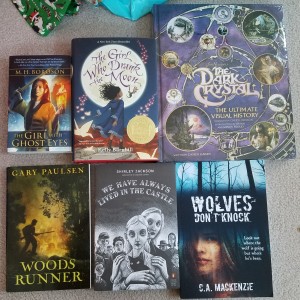
My TBR list
The Girl with Ghost Eyes
It’s the end of the nineteenth century in San Francisco’s Chinatown, and ghost hunters from the Maoshan traditions of Daoism keep malevolent spiritual forces at bay. Li-lin, the daughter of a renowned Daoshi exorcist, is a young widow burdened with yin eyes—the unique ability to see the spirit world. Her spiritual visions and the death of her husband bring shame to Li-lin and her father—and shame is not something this immigrant family can afford.
When a sorcerer cripples her father, terrible plans are set in motion, and only Li-lin can stop them. To aid her are her martial arts and a peachwood sword, her burning paper talismans, and a wisecracking spirit in the form of a human eyeball tucked away in her pocket. Navigating the dangerous alleys and backrooms of a male-dominated Chinatown, Li-lin must confront evil spirits, gangsters, and soulstealers before the sorcerer’s ritual summons an ancient evil that could burn Chinatown to the ground.
With a rich and inventive historical setting, nonstop martial arts action, authentic Chinese magic, and bizarre monsters from Asian folklore, The Girl with Ghost Eyes is also the poignant story of a young immigrant searching to find her place beside the long shadow of a demanding father and the stigma of widowhood. In a Chinatown caught between tradition and modernity, one woman may be the key to holding everything together.
The Girl Who Drank the Moon
Every year, the people of the Protectorate leave a baby as an offering to the witch who lives in the forest. They hope this sacrifice will keep her from terrorizing their town. But the witch in the Forest, Xan, is kind. She shares her home with a wise Swamp Monster and a Perfectly Tiny Dragon. Xan rescues the children and delivers them to welcoming families on the other side of the forest, nourishing the babies with starlight on the journey.
One year, Xan accidentally feeds a baby moonlight instead of starlight, filling the ordinary child with extraordinary magic. Xan decides she must raise this girl, whom she calls Luna, as her own. As Luna’s thirteenth birthday approaches, her magic begins to emerge–with dangerous consequences. Meanwhile, a young man from the Protectorate is determined to free his people by killing the witch. Deadly birds with uncertain intentions flock nearby. A volcano, quiet for centuries, rumbles just beneath the earth’s surface. And the woman with the Tiger’s heart is on the prowl . . .
The Newbery Medal winner from the author of the highly acclaimed novel The Witch’s Boy.
The Dark Crystal: The Ultimate Visual History
A bit about this one: as a kid, I was absolutely obsessed with the movie The Dark Crystal. I think I watched it four times per week during the summer. I woke each morning to check if I had sprouted wings, like the female gelfling Kira. When I learned that a television series is in the works based on the original film, I renewed my interest in my childhood obsession, and I look forward to sharing it with my kids.
Dark Crystal: The Ultimate Visual History is the definitive collection of rare artwork, interviews, and on-set photos from the beloved Jim Henson fantasy classic.
A true masterpiece brought to life by the ingenious puppetry and peerless storytelling of Jim Henson, Dark Crystal is revered by an entire generation of fans. For the first time, this deluxe and highly comprehensive book tells the complete story of this deeply personal Henson project, highlighting the unique creative journey and groundbreaking techniques that brought the film to the screen. Drawing from unseen archive interviews with Jim Henson and new interviews with the film’s behind-the-scenes creative team, Dark Crystal: The Ultimate Visual History leaves no stone unturned in chronicling the entire production, from the initial concept based on themes close to Henson’s heart to the ingenious conceptual design, puppet construction, and logistics of the shoot itself. The book also delves into the wider world of Dark Crystal, exploring the creation of comics, novels, and other official projects inspired by the film.
This deluxe coffee-table book contains an in-depth look at the day-to-day production of the film and showcases a huge range of incredible visuals, including candid set photography, previously unseen concept art, storyboards, production notes, and more. The book also features a plethora of amazing removable items, such as script pages, notes and sketches from Henson, and other unique treasures. Definitive, enthralling, and revelatory, Dark Crystal: The Ultimate Visual History is the last word on an enduring modern classic and the book that fans of the film have been waiting for.
Woods Runner
Hatchet was one of my favorite childhood books because I adored the protagonist’s resourcefulness in a live-or-die situation. I am eager to read one of Paulsen’s other works, in anticipation of sharing it with my kids.
Samuel, 13, spends his days in the forest, hunting for food for his family. He has grown up on the frontier of a British colony, America. Far from any town, or news of the war against the King that American patriots have begun near Boston.
But the war comes to them. British soldiers and Iroquois attack. Samuel’s parents are taken away, prisoners. Samuel follows, hiding, moving silently, determined to find a way to rescue them. Each day he confronts the enemy, and the tragedy and horror of this war. But he also discovers allies, men and women working secretly for the patriot cause. And he learns that he must go deep into enemy territory to find his parents: all the way to the British headquarters, New York City.
We Have Always Lived in the Castle
Taking readers deep into a labyrinth of dark neurosis, We Have Always Lived in the Castle is a deliciously unsettling novel about a perverse, isolated, and possibly murderous family and the struggle that ensues when a cousin arrives at their estate. This edition features a new introduction by Jonathan Lethem.
For more than seventy years, Penguin has been the leading publisher of classic literature in the English-speaking world. With more than 1,700 titles, Penguin Classics represents a global bookshelf of the best works throughout history and across genres and disciplines. Readers trust the series to provide authoritative texts enhanced by introductions and notes by distinguished scholars and contemporary authors, as well as up-to-date translations by award-winning translators.
Wolves Don’t Knock
I’m excited for this novel, as it’s written by fellow Spot Writer Cathy MacKenzie, and the psychological elements are right up my alley.
A psychological drama/thriller, with elements of suspense, mystery, romance, and family relationships. Suitable for mature teens and up.
Twenty-two-year-old Miranda escapes from her abductor and the wolves that have tormented her soul for six long years. She returns to her childhood home where her mother, Sharon, caring for Miranda’s son, Kevin, has feared for her daughter’s fate. Uncertainty and distrust taint the first year after Miranda’s return. Miranda and Sharon hide secrets they dare not reveal while constantly wondering when Miranda’s kidnapper will reappear. Can mother and daughter bury their demons and repair their strained relationship? Can Miranda bond with the baby she never knew and find the love she so desperately wants? Will Kevin’s father play a role? Will Sharon find the answers she needs to recover from her own troubled past?
Although this book deals with sensitive issues, there are no graphic sexual scenes.
The Giveaway:
For this giveaway, we have up for grabs a paperback copy of The Scarred Letter, an e-copy of The Scarred Letter, and a paperback copy of Faulkner’s Apprentice.
The Scarred Letter
 Heather Primm never anticipated that a single blog post could ruin her life.
Heather Primm never anticipated that a single blog post could ruin her life.
Heather’s scoop about steroid use by key players on the school football team sets off an investigation that strips the Orchard Valley Thunderbolts of their state title—and earns Heather a coveted journalism prize. Hated by those involved in the scandal, despised by jealous members of the newspaper staff, ignored by her newly-popular ex-boyfriend, and even berated by her mother, Heather is attacked and a chilling “T” is carved into her face.
Now stigmatized as a traitor, she becomes the object of scorn for nearly all of Orchard Valley High. But when the school offers to send her to a private academy to hush up the matter, Heather is forced to make a decision. Should she refuse to allow fear to control her life by holding to the truth, or accept the chance to escape and build a new life?
Written by a veteran English teacher, The Scarred Letter weaves themes from Nathaniel Hawthorne’s The Scarlet Letter into an accessible, intelligent tale of modern isolation and a young woman’s quest for truth and acceptance.
Faulkner’s Apprentice
This one is no longer available at Amazon, as the publisher is not in existence anymore, but I still have a few copies to sell or give away.
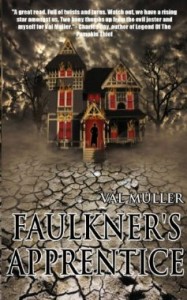 Lorelei Cecelia Franklin broke a twenty-year streak of bad luck when she won the L. Cameron Faulkner fiction contest. Apprenticed to the reclusive and famous author, Lorei will spend three weeks with the master of horror himself in the secluded mountains of Virginia. On her way to Faulkner’s mansion, Lorei meets a leathery man who snares souls that desire too much, and everything in the mansion screams warnings against him. But with her lust for Faulkner, her appetite for fame, and her wish to protect her ailing mother, Lorei’s chances for escape are slim.
Lorelei Cecelia Franklin broke a twenty-year streak of bad luck when she won the L. Cameron Faulkner fiction contest. Apprenticed to the reclusive and famous author, Lorei will spend three weeks with the master of horror himself in the secluded mountains of Virginia. On her way to Faulkner’s mansion, Lorei meets a leathery man who snares souls that desire too much, and everything in the mansion screams warnings against him. But with her lust for Faulkner, her appetite for fame, and her wish to protect her ailing mother, Lorei’s chances for escape are slim.
Enter the giveaway here:
a Rafflecopter giveaway



